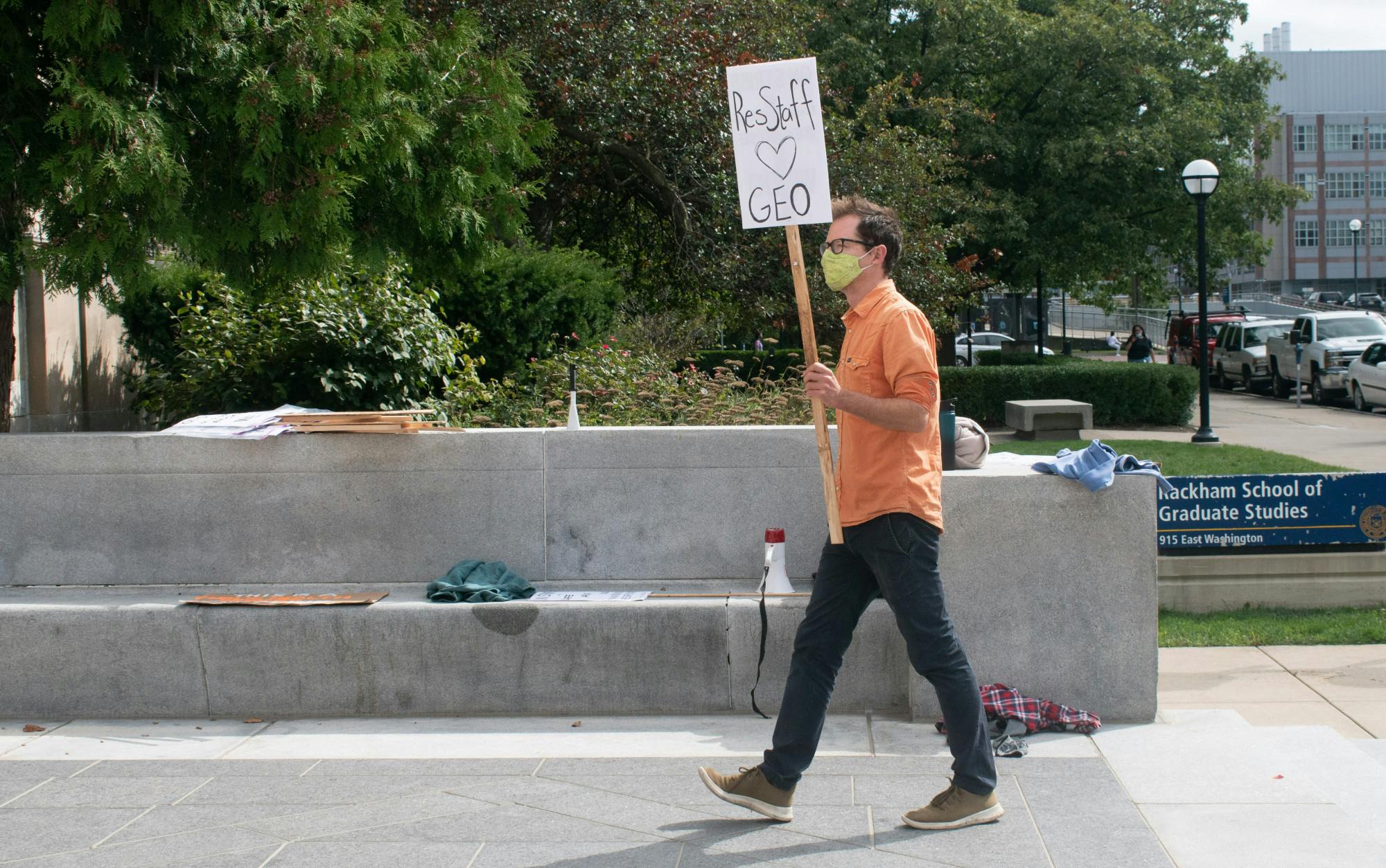This past week, graduate employees and others at the University of Michigan have been on strike in response to the university's decision to continue some in-person instruction this fall.
Similar concerns stretched to other universities including Michigan State, where graduate students called for MSU to go fully online for lack of consideration or consultation of graduate employees in the reopening decisions, prior to the university’s official shift to a remote fall semester.
What’s happening at U-M?
As the university started their second week of classes, U-M’s Graduate Employees Organization, or GEO, which represents around 2,000 graduate student instructors and assistants at the university, authorized a strike against their administration’s decision to continue in-person instruction this fall. On Twitter, the GEO announced their strike as a historic moment.
On Labor Day, following the announcement of the strikes, the university’s public affair department released a statement denouncing the GEO's strike for going against contract and the law.
On Tuesday morning, members of the GEO declared a work stoppage and formed picket lines across campus to begin their strike set to last until Friday.
The GEO's MSU counterpart, the Graduate Employees Union, or GEU, supports their strike to protect the health and safety of both their members and of their communities.
"Specific aims to improve campus health and safety include transparency in how COVID data is collected and used, defunding and demilitarizing campus police, providing childcare stipends, and repealing the international student fee," GEU Chief Information Officer Vee Lawson said in an email. "All of these demands go into making campus a safe and healthy workplace for GSIs (graduate student instructors)."
On Tuesday U-M filed an unfair labor practice charge to intervene the strike.
Some resident advisers and staff also began to strike throughout the week calling for stronger communication from the university and increased COVID-19 protection.
By the end of the week, dining hall employees planned to stage a walk out as well, which was later postponed and replaced by a slow down.
Sunday night the GEO announced they were extending their strike until this Friday.
Currently, 80% of undergraduate classes at U-M are remote. The administration said they are continuing classes as planned, university spokesperson Rick Fitzgerald said in an article from U-M Public Affairs.
What are the demands?
According to their website, the GEO listed the following COVID-19 and anti-policing demands to the university:
- For the whole community, sufficient, transparent, robust plans for testing, contact tracing, and campus safety.
- For graduate employees, a universal right to work remotely without documentation, resources for remote work, better representation in the decision-making processes of the university surrounding health measures, and access to the health models motivating current policy.
- For parents and caregivers, care subsidy regardless of a care provider’s license status and location and the age of those who need care; allow for healthcare plans to be maintained and available even during leaves of absence taken by anyone, at no extra cost.
Support student media!
Please consider donating to The State News and help fund the future of journalism.
- For international students, better International Center support and the repeal of the $500 international student fee and document shipping fee.
- For graduate students, unconditional support in the form of extensions to degree timelines and funding, a $2,500 unconditional emergency grant, rent freezes and flexible leases for on-campus housing.
- Access to a disarmed and demilitarized workplace, where lethal weapons are prohibited, our security services do not receive military funding, there is transparency around the use of surveillance technology, there is a standard of force for campus police, and no one faces retaliation for being unable to work due to police presence.
- The defunding of the Division of Public Safety and Security, or DPSS, involving a cut of 50% of their annual budget and a reallocation of the funds to community-based justice initiatives.
- U-M cut all ties with police, including Ann Arbor Police Department, or AAPD, and Immigration and Customs Enforcement, or ICE.
On Wednesday, U-M administrators tried to reach an agreement with the GEO, but they rejected the deal and continued their strike.
Under the university’s proposed plan graduate student employees would be able to cancel class if a student refuses to wear a mask, and if they request to work remotely, they would not be able to do so while their request is considered and arbitrated.
The deal included some compromises regarding international student issues, child care, testing and modeling, and police practices.
The deal, however, could not yet grant graduate students an additional year to complete their degrees, and rather than go entirely remote this semester as asked, the university would withdraw the labor practice charge filed against GEO and not discipline or penalize employees who took part in the strike if the parties reached an agreement and the strike ended, according to a Wednesday statement from U-M Public Affairs.
ReclaimMSU has been vocal on social media on their support for the strike as the motive shows what can happen when leadership fails.
"Reclaim MSU advocates for shared governance, in which students, faculty, and staff are involved in university decision making at the highest levels," ReclaimMSU said in a statement. "The GEO strike at the University of Michigan illustrates what happens when administrators make decisions alone, without shared governance and without fully engaging all stakeholders. This action also demonstrates the moral power and organizational strength of the GEO. We stand in solidarity with them and applaud their courage."
Why is this important to MSU?
Michigan State announced undergraduate classes would be going remote for the fall semester Aug. 18, after spikes in COVID-19 cases across the country following the reopening of colleges and universities.
Prior to the announcement, MSU's GEU created their own list of demands and was going to hold a town hall to address their concerns with the university's decision to reopen, and there's a possibility MSU could have ended up similar to U-M had classes not moved online.
"There is a strong chance that the GEU would have been forced to escalate our response had MSU not moved undergraduate classes online," Lawson said. "Our members were strongly concerned about the impact of reopening on their own health and safety and that of their families and local communities. By standing in solidarity with striking GEO members, the GEU reaffirms that all graduate workers deserve safe, healthy working conditions."
Although MSU has moved online for the fall, no plans for the spring semester have been made, leaving graduate employees concerned as MSU could try to bring classes back in the spring and universities have begun to lobby for liability protection.
"We have no reassurances that MSU will not attempt to bring classes back in-person before it is safe to do so," Lawson said. "MSU is one of a dozen universities who have lobbied for liability protection to reopen campus. ... This does not suggest that MSU is willing to take responsibility for student well-being on its campus, and makes it more critical than ever to stand with other graduate employee unions to demand safe and fair working conditions across Michigan universities."
According to MSU President Samuel L. Stanley Jr., university administration is unsure of when the decision for spring semester will be made as it is still early.
When the decision is made graduate employees feel they need to be involved in the process as they too are a valuable part of higher education.
"Graduate employees occupy a precarious position in the ecosystem of higher education, alongside staff and non-tenure track faculty," Lawson said. "Graduate employees are part of the stakeholders on campus, all of whom suffer when there are budget cuts and all of whom are viewed not as community partners but as liabilities by the university-as-corporation. Graduate students are both learners and employees of the university, but this dual role is conveniently forgotten when administrations make decisions about the working conditions under which graduate employees provide a significant amount of the teaching and research done at our universities."
Stanley said they plan on getting input from many groups when deciding to reopen campus in the spring.
"We'll always do our best to get input as we make these decisions to understand from different groups, how they're impacted potentially and understand that so that will definitely be finding ways to get input from people," Stanley said. "That was part of the whole process by which we opened and the working groups we set up was designed to give us the opportunity to get input from a number of different constituent groups and we'll continue to work that way when we think about the spring."
U-M's GEO has created a master document for those not affiliated to support their strike.
"Standing in solidarity with graduate employees and other precarious workers ensures that universities fulfill their obligations to provide safe, healthy working conditions for all employees, improving the educational experience for students and building a stronger community," Lawson said. "Furthermore, in response to the devastating effects of COVID-19, which has disproportionately affected Black and brown communities, and to the ongoing effects of police violence, the University of Michigan and all universities need to protect their most vulnerable members. GEO is asking the University of Michigan to step up to its responsibilities to its communities. We at the GEU stand by them and ask you to do the same."
Discussion
Share and discuss “What's happening at University of Michigan” on social media.









